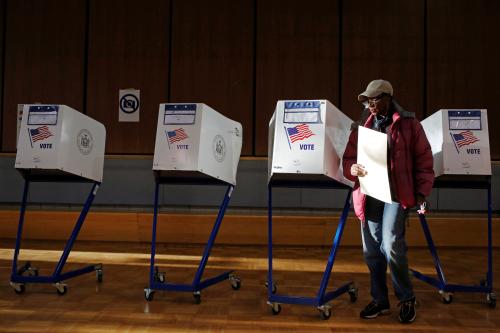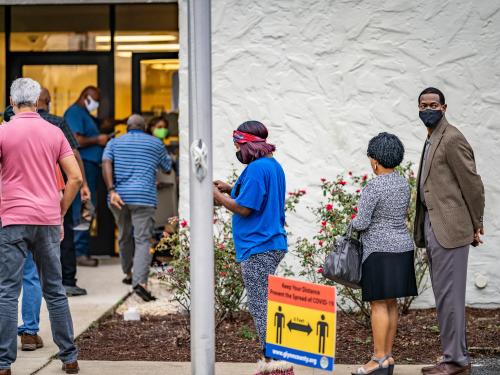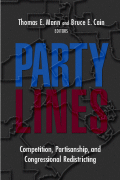Last month, President Trump signed an executive order to establish the Election Integrity Commission, a bipartisan effort to review the policies and practices that support or undermine confidence in U.S. federal elections. The commission, co-chaired by Vice President Mike Pence and Kansas Secretary of State Kris Kobach (whose role has already stirred controversy), is focused on improper voter registrations and voter fraud, an interesting starting point given the president’s correlation of this problem to his loss of the popular vote and the mounting speculation of Russian interference in the 2016 presidential election.
The commission’s formation came just days after the Supreme Court rejected an appeal to reinstate North Carolina’s stringent voter identification laws that were found to discriminate against African Americans “with almost surgical precision.” Within days following this ruling, the court also found that two of North Carolina’s congressional redistricting maps resulted from unconstitutional racial gerrymandering. The decision—even supported by the more conservative Justice Clarence Thomas—found that African Americans were unfairly packed in two concentrated black districts, thereby minimizing their political influence in major elections.
These two actions emerge just four years following the Supreme Court’s Shelby County v. Holder decision in 2013, which invalidated the coverage formula that determined when Section 5 of the Voting Rights Act (VRA) required jurisdictions to submit changes in their voting laws to the federal government for preclearance. This decision permitted states like North Carolina to capriciously change their voting laws, contributing to these and other flagrant acts of voter suppression.
Given these obvious flaws in the voting process, the priorities of the bipartisan commission should be shifted from inconsequential allegations of voter fraud to acts of suppression that continue to historically and systematically disenfranchise African Americans and other vulnerable groups.
The historical bait and switch of voter fraud claims
“Stolen elections” can be traced back to the presidential election of 1860, when Abraham Lincoln’s 180 electoral votes were called into question by egregious claims of political corruption, favoritism, changing convention rules, and other non-democratic activities.
The Reconstruction period later surfaced cases of voter fraud, despite the passage of the 15th Amendment, which prohibited the direct disenfranchisement of citizens based on race or former enslavement. Instances of ballot stuffing, discarded or miscounted party vote were part of a broad strategy by white Democrats (then the face of white supremacy) who sought to regain power in the South. Years later, these problems ultimately led to necessary reforms, including the introduction of voter registration and the use of secret ballots.
Over the next few decades, Republicans would lead the charge to decry voter fraud to maintain their political majority. During the 1960 presidential election, reports of deceased and other unregistered voters in largely African American districts in Illinois or cases of malfeasance throughout Texas were believed to have rigged John F. Kennedy’s victory over Richard Nixon. Years later, former Attorney General John Ashcroft formed the “Ballot Access and Voting Integrity Initiative” under the Bush administration to weed out voter fraud before the next major election. Despite his coordination of the U.S. attorney offices with local election officials, only 24 people were convicted of improper or illegal voting and 14 noncitizens were found to be illegally voting in federal elections between 2002 and 2005.
These and other complaints of voter misconduct have yielded similar results—an insignificant impact on federal elections. And Republican allegations of voter fraud, including Trump’s executive order, have borderline (if not obvious) discriminatory intent, especially when voter suppression efforts are dismissed.
Massive voter Fraud is a myth, period
Research from the Brennan Center for Justice has found that voter fraud cases—whether related to clerical, typographical, bad matching data, or poorly updated personal records are few and far between. When incidents are identified, they are punishable by law. While the current administration has called out double voting or registration (when someone votes twice in his resident state or another state), election fraud among dead voters, and intentional fraud by noncitizens, these cases combined do not impede federal elections.
There were reports in 2004 that 4,755 deceased voters cast ballots in New Jersey. After careful comparison between voter rolls and death records, there were no official accounts of voter fraud. In New York in both 2002 and 2004, 2,600 deceased voters allegedly voted, only to be removed from the register after an investigation revealed clerical errors and not malfeasance.
The Brennan Center’s research also found that noncitizens, who face the harshest penalty of deportation if found illegally voting, had even fewer cases of actual voter fraud.
The real issue is voter suppression
Given such findings, a bipartisan commission focused on restoring election integrity must focus on the persistent and rampant disenfranchisement of millions of Americans. As summarized by author and advocate Ari Berman, today’s voting dilemma is perhaps at its worst primarily because the nation’s laws to protect voters are now without the full protection of the Voting Rights Act.
After the Shelby County v. Holder decision and leading up to the 2016 election, more stringent photo identification requirements have become the new “poll tax” for more than 21 million Americans, or 11 percent of the entire voting-eligible population without government-issued photo IDs. While North Carolina’s attacks on voter freedom may have been reprimanded by the Court, other states continue to enact tougher restrictions on historically and legally disenfranchised citizens.
Wisconsin’s efforts mirrored those in North Carolina where advocates purported that nearly 300,000 people lacked the proper ID to participate in the 2016 presidential election, even after parts of the state’s law were deemed unconstitutional upon appeal. In Florida, 1.5 million people were disenfranchised by a law that disqualifies ex-felons from voting, resulting in one in every four African American residents unable to vote in 2016.
Added to these actions, Attorney General Jeff Sessions has begun unraveling any Obama-era work on voting rights, starting with the Department of Justice’s withdrawal of its claim of the discriminatory intent in Texas ID laws. Kris Kobach may be poised to use the commission to back up his state’s own allegations of voter fraud to maintain the Republican majority.
Remedying the betrayal of millions of citizens who were, and continue to be, denied their right to vote should be the first course of action for the commission. Debates and denials over the existence of voter suppression seems to suggest that the nation does not seek to embolden a more inclusive democratic process—more than 50 years after the passage of the Voting Rights Act.
The Brookings Institution is committed to quality, independence, and impact.
We are supported by a diverse array of funders. In line with our values and policies, each Brookings publication represents the sole views of its author(s).



![For USA-ELECTION/VOTING-NORTHCAROLINA [moving at 0600 EDT (1000 GMT) Friday, July 15, 2016]A pile of government pamphlets explaining North Carolina's controversial "Voter ID" law sits on table at a polling station as the law goes into effect for the state's presidential primary in Charlotte, North Carolina, U.S. on March 15, 2016. REUTERS/Chris Keane/File Photo - RTSI0CT](https://www.brookings.edu/wp-content/uploads/2017/01/gs_20170123_nc-voter-id.jpg?quality=75&w=500)






Commentary
Trump’s election integrity commission needs to redress voter suppression, not fraud
June 21, 2017